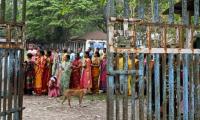After World War II, the UN was established in 1945, initially by 51 leading countries to prevent future wars. However, its mission to preserve the world peace remains an uphill task owing to proxies of regional and global players. Similarly, the Financial Action Task Force (FATF) came into existence in the aftermath of G7 Paris summit in 1989 with the primary objective of monitoring money laundering, especially through drug trafficking.
Subsequently, the head of the states of G7 countries, president of European Commission and eight other countries convened the FATF. In April 1990, FATF issued 40 recommendations to fight money laundering. In 2001, global terrorism was added to countering terror financing among FATF tasks. In October 2004, FATF published its 9th special recommendations (40 + 9) that continued till 2012. FATF’s canvas was further enhanced by adding new threat of proliferation of Weapons of Mass Destruction. With the enhanced terms and responsibilities, its members were also increased. From 16 members, it ranks swelled to 39 active members to monitor 200 member countries and territories.
Consequent to its monitoring mechanism, FATF has a Black List and a Grey list. Unsurprisingly, only two countries from the globe — Iran and North Korea — are in the Black List i.e. high risk jurisdiction. But the critical analysis of the blacklisted countries raises questions whether FATF is a neutral body or just another foreign tool? The Grey List, currently comprising 16 countries, including Albania, the Bahamas, Barbados, Botswana, Cambodia, Ghana, Jamaica, Mauritius, Myanmar, Nicaragua, Pakistan, Panama, Syria, Uganda, Yemen, and Zimbabwe poses disturbing concerns and queries.
A deep study reflects that putting Pakistan at par with African countries and war-torn Cambodia does not seem justified. Intelligentsia have argued that Pakistan is only being punished for being in the Chinese alliance. Sri Lanka was put in the Grey List after offering her support to China, but when Lanka reviewed its policy towards China on the dictation of global players, it was subsequently removed from that list. Similarly, Iceland was also removed from the Grey List. According to the Basel anti-money laundering index, Afghanistan, Liberia, Haiti, Kenya and Vietnam are amongst the top 10 countries involved in money laundering, but they are not part of grey or blacklists. So, FATF’s implementation policy remains questionable and highly discriminatory. Moreover, India is involved in destabilising Afghanistan, SAARC, sponsoring terrorism in Pakistan (Kulbhushan Jadhav case), conducting brutalities in Kashmir, and allowing the RSS to massacre minorities. The lawlessness in 11 Indian states, the forcible occupation of Junagarh, are substantial evidences to put India in the Black List, but it remains at large exhibiting the hypocrisy of global powers.
Despite Pakistan addressing almost all the FATF observations, keeping it in Grey List raises many concerns in the minds of people. Many opine that the Asia Pacific Group is perhaps playing a dirty game, especially in case of Pakistan as it has active representation from India. If the FATF still does not clear Pakistan in the next scheduled session of June 2021, then Pakistan must adopt an offensive posture and think over if the China factor is being used to pulverize Pakistan?
In the end, I urge FATF to investigate India’s atrocities and pay attention to the fresh list of top 10 countries in the Basel anti money laundering index. Blind following of dictates of global powers has already turned WHO, IMF, WB, and UNO as tainted organizations, who lost credibility. It is hoped that the FATF will not fall prey to international conspiracies.
Haisum Bukhari is student of Defence and Strategic Studies at Quaid-e-Azam University, Islamabad
President called the Senate meeting under Article 54 of the Constitution
Crowd’s long wait due to persistent rain backed by heavy showers came to an end just for two deliveries with New...
Chief Justice Justice Faez Isa said amendments to the High Court Rules were necessary before appointment of judges
A division bench of the PHC comprising Justice SM Attique Shah and Justice Syed Arshad Ali heard the petition in which...
According to the Senate Secretariat, Gilani emphasized better coordination between the two Houses







